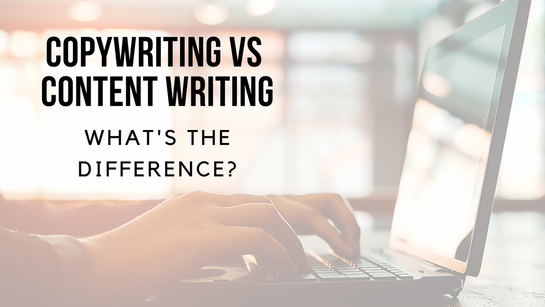Content without copywriting is a waste of good content." - Copyblogger Have you ever thought about how content and copywriting are related? Do you agree with Copyblogger that content without copywriting is a waste...? I remember when I first started writing for businesses. Even I was confused about whether I was a copywriter, a content writer, or something else altogether. For awhile, I just used 'freelance writer' as my go-to because, well... it was easier! So what's the difference between copywriting and content writing? Let's put this dilemma to rest right here and now. In this post, we'll dive into the difference between the two kinds of writing for businesses. We'll also uncover the reasons that you don't just need copy or only need content. You actually need both for your marketing to be effective. So, of course... Copyblogger is right! (But the good folks over there didn't need me to say that...!) What is copywriting?"Copywriting is the art and science of using words to get a reader to take action. Online, copywriting is your online salesperson. Let that sink in. Words are responsible for selling. Which means they are directly connected to revenue." - Copyhackers What is it you want your reader to do? Buy your products, sign up for your programs or your newsletter, schedule a discovery call... Copywriting is the key to make that happen. For a small business owner who's not a writer, maybe that sounds intimidating. Especially if you're not sure what you're supposed to say to help the right people buy what you're offering. And... if you want to say it in a way that doesn't feel manipulative or deceptive. Most small business owners I know are people like you. You're not sleazy, and you don't want to come across that way in your marketing. But here I am telling you that you need copywriting for your marketing to be effective, and copywriting is salesy. Not sleazy, mind you! But sales-y. It's persuasive and convincing. It's written to get people to take action. Period. How To Inspire Action One of the ways copywriting achieves the goal of getting readers to take action is by appealing to their emotions. Persuading them by talking to them where they are, in whatever struggle they're having... and offering the solution they're looking for. Lots of promotional materials include copywriting — advertisements, brochures, website content. These are the pieces that use persuasive language and copywriting techniques to move the readers to do something. Did you know that some of the tools in a copywriter's toolbox are catchy headlines? If written well, they draw people into the marketing piece and get them to start reading it. But copywriters don't stop there. Think about a website for example. The best copywriting shows itself when you land on a website and... Can't. Stop. Reading. Sure, you likely got drawn in with a catchy headline, but the rest of the copy had to be well written and persuasive for you to keep reading, right? Copywriters know the secret to compelling copy that convinces readers to stick around. Remember, the goal of copywriting is to get people to take action, whether that’s signing up for a newsletter, buying a product, or simply clicking through to a website. In order to achieve this, copywriters must carefully craft the content to be engaging and persuasive. When to Use Copywriting Use copywriting when you want people to do something specific. We've already mentioned the actions we may want readers to take — signing up for a newsletter or buying a product or service, for example. The goal of copywriting is creating a message that's so compelling that people will respond to it. Copywriting is best when you want to create marketing materials such as sales pages, landing pages, or email campaigns. Not sure how to do that? Copywriters can help you create persuasive and compelling content that will convince your readers to take action. Copywriting ExamplesCopywriting goes hand in hand with other marketing disciplines, such as search engine optimization (SEO), social media marketing, and email marketing. Here are some more examples of copy that includes the kind of persuasive language we've been talking about:
What is Content Writing?Content writing can take various forms, but in essence, it comes down to creating content for digital formats — and (at least in our case) for marketing purposes...Content writing is the process of writing, editing, and publishing content in a digital format." - HubSpot Content writing serves a different purpose than copywriting. It can seem a little confusing because whenever you create content for your small business, you should include a call to action — that is, tell the reader what you want them to do next. So just like with copywriting, we want the reader to do something after they read. But content writing really serves the longer content marketing game. We create content to inform our readers, to give them the valuable information they need to solve the problems we can help them solve. The more content we offer that provides answers to the questions they're asking, the more our audience starts to look to us for the answers. And that's when we start to build trust and become an authority in our industry. Does that make sense? Something else to remember is that we never create content just for the sake of creating content. We want to tie it to our products and services, to take our readers a step closer to buying from us. Not by manipulating or being sleazy salespeople, but by providing genuine solutions to the problems they're facing. Content writing can take many forms by the way — blog posts, articles, white papers, ebooks, social media posts, and more. And while the goal of content writing is to provide readers with valuable information that helps them understand a topic or solve a problem, content writers also focus on search engine optimization (SEO)...using key words effectively. Writing web pages and articles that rank high in search engine results pages (SERPs) is important in content writing because you want your ideal clients to find you. And SEO-optimized websites give them a better chance of doing that. When to Use Content Writing Use content writing when you want to create content for your website, blog, or social media accounts. And remember, content isn't just online. Print materials that inform your audience also fall under the 'content' category. (Some of those also fall under 'copywriting,' but you already knew that, didn't you?) While copywriting makes use of techniques and language meant to persuade, content writing focuses more on providing information that's interesting and engaging for your readers. Engaging content will attract and retain website visitors as well as build brand awareness and credibility for your business. Here are a few key things to keep in mind about content writing:
Did you know good content writers have developed the art of crafting compelling content to keep your audience engaged from start to finish? They also have the research skills to gather accurate information and compile it into an engaging article or blog post that will keep your readers both interested and informed. Content Writing ExamplesContent marketing is the process of planning, creating, and sharing content with your target audience. It helps you generate brand awareness, convince customers to take action, and drive revenue. There are various types of content marketing, like social media and blogs, but new trends and techniques emerge every year that change the ways businesses reach their audiences." - HubSpot Remember, content writing is all about creating content that's both useful and engaging for your audience. When done well, content writing can help you attract and retain customers, boost your website’s search engine ranking, and even increase sales. This blog post you're reading is an example, of course, and here are a few other examples to give you ideas:
Do businesses need copywriters or content writers? You may be asking yourself whether your business needs a copywriter or a content writer. The answer is it needs both, and here's why... Copywriters write the text for advertising and marketing materials. In the writer's world, we call that text 'copy.' And remember, persuasive copy lives on landing pages, sales pages, ads, and more. It also lives on a website's home, about, and services pages. Good copywriters have developed the skill to write that persuasive, attention-grabbing copy that'll convince customers to buy your products or services. So wherever you need copy that sells, you also need a solid copywriter. But... you don't just need a copywriter. The top challenges marketers face with content marketing are creating content that generates leads, finding ideas for new content, and creating content that receives high levels of online engagement." Remember all those blog posts, email newsletters, and social media posts you planned for when you developed your content strategy? For those, you need the help of a skilled content writer. Good content writers write interesting, well-researched content that'll keep readers engaged and coming back for more. Content writers contribute to the building of relationship between product or service providers and their potential clients. The long and short of it is... businesses need both copywriters and content writers. Copywriters craft marketing copy that converts. Content writers create the content that keeps your audience informed, answers their questions, and builds their trust in you, cementing a relationship that could very well lead to future business. Can the same writer create copywriting and content writing? If you're wondering whether the same writer can create copy that converts and write content that informs, the answer is yes! With a caveat... It is true that the two genres require different skills. By now, you've got this down... Copywriting is all about getting people to take a specific action, such as buy a product or sign up for a service. Content writing mostly provides authority-building information that deepens relationship and builds trust in your business. A lot of times, a good copywriter can also hammer out engaging content that checks all the boxes in your content marketing plan. But without some training, a good content writer may not be able to effectively craft converting copy. On the flip side, with solid professional development, a good writer can develop both sets of skills — create compelling conversion copy and craft informational content that builds trust. The differences between copywriting and content writing are clear, but one without the other is not enough for your business to experience marketing success. Both are important for businesses of all sizes. Looking for a copywriter or content writer for your small business? Reach out to Julie Novara. She happens to be both!
0 Comments
|
Julie J. NovaraJulie's a copy and content writer for small businesses making a big difference! Archives
August 2022
Categories
All
|
|
© 2024, Julie Johnson Writing Services PO Box 616 Alamance, NC 27201 (336) 539-1655 ALL RIGHTS RESERVED. |






 RSS Feed
RSS Feed
